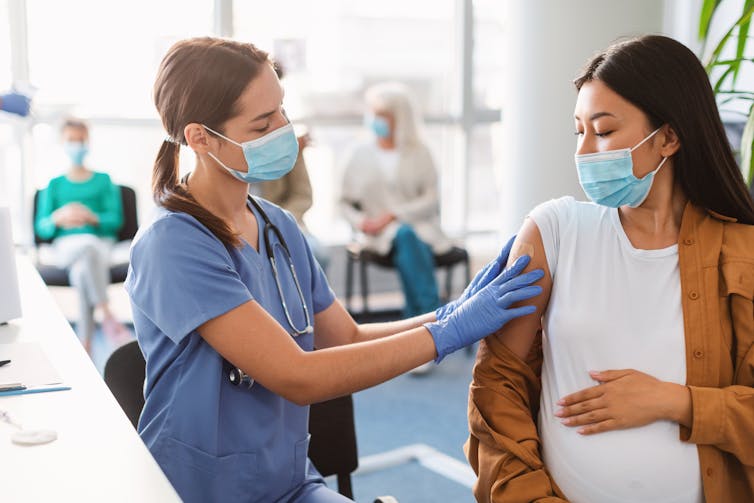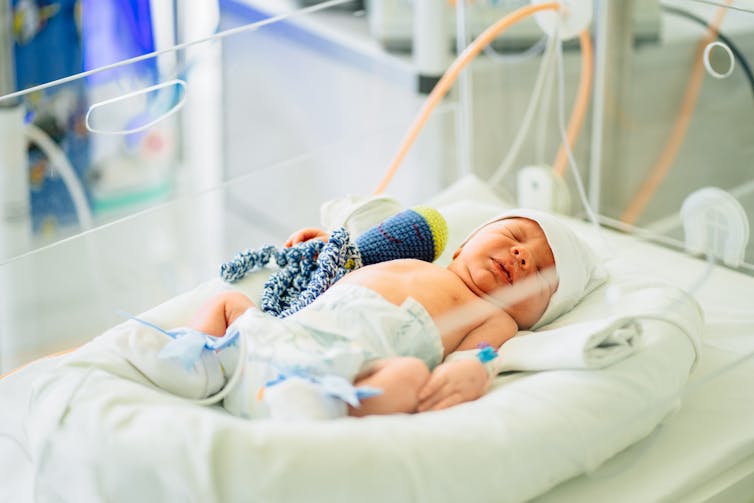
Last week, South Australia announced it would offer pregnant women a vaccine against respiratory syncytial virus (RSV) from next year for free. It’s the first Australian state or territory to do so.
RSV can be particularly serious for infants, so vaccination during pregnancy is designed to protect the baby.
The vaccine, called Abrysvo, was registered for use in pregnancy by Australia’s Therapeutic Goods Administration in March 2024. It’s also approved for use in adults over 60, who are vulnerable to RSV as well.
However, vaccination against RSV is not funded under the National Immunisation Program. This means people who want a vaccine need to pay for it, unless it’s offered by a state or territory program.
So why is South Australia planning to offer pregnant women this vaccine? And if you’re expecting a baby, is Abrysvo worth considering?
What is RSV?
RSV infects the lungs and the respiratory tract. It’s extremely common, with most children infected by the age of two. In most people, the symptoms are mild, such as a runny nose, dry cough, sore throat, sneezing or headache.
However, in babies under 12 months, and especially under six months, the symptoms can sometimes be severe, causing breathing difficulties requiring admission to hospital. This is because the infection can spread to the lungs, causing pneumonia.
RSV can also cause severe infection in premature babies and those with other medical conditions such as heart disease or a weakened immune system.
There’s no specific treatment against this virus once someone is infected. Antibiotics do not work against RSV infection, so prevention is key.
Fortunately, there is now a vaccine available in Australia that can protect the most vulnerable. This vaccine is also approved in Europe, the United Kingdom and the United States
What is the vaccine and how does it work?
The Abrysvo vaccine is a protein subunit vaccine, which means it targets an important protein of the virus called the RSV F protein.
The vaccine, if given to a mother during pregnancy, leads her to make antibodies against RSV. Antibodies are an important part of our immune system that help protect us against infection and severe disease.
These antibodies cross the placenta to the baby, so when it’s born it is ready and able to fight against RSV if it encounters the virus.
This vaccine does not contain any live virus, so you can’t catch RSV from the vaccine.
The vaccine is recommended for pregnant women at 28–36 weeks of pregnancy. Only a single dose is required.
How effective is the vaccine? And is it safe?
In a phase 3 clinical trial, Abryvso was most effective in protecting infants in the first three months of life, and then declined over time. This trial was conducted in 18 countries and included 3,682 pregnant women who received the vaccine and 3,676 pregnant women who received a placebo injection.
The efficacy (how well it protects against severe disease) was 81.8% in the first three months after birth, then dropped to 69.4% at six months. The vaccine was less effective at protecting against moderate infection, with 57.1% efficacy up to three months of age.
It remains unclear how long protection lasts for beyond the first six months of life. However, it is babies in these first few months of life who are at highest risk.

The rate of side effects reported was similar for the women who received the vaccine (13.8% reported an adverse event in the month after vaccination) and the women who received the placebo (13.1% reported an adverse event).
The most common local reaction reported in both the vaccine and placebo groups was pain at the injection site. The most common systemic symptom reported in both groups was fatigue.
The rate of preterm birth was similar for the two groups. There were 28 cases of preterm birth in the group who received the vaccine compared to 23 cases in the group who did not receive vaccine.
Are there other alternatives?
Beyfortus (also known as nirsevimab) is a treatment called a long-acting monoclonal antibody. This can be given to babies from birth. Like the antibodies that cross the placenta after the mother is vaccinated during pregnancy, nirsevimab can also protect the baby during the first six months of life.
However, access to nirsevimab currently varies according to the state you live in. Western Australia, Queensland and New South Wales have this year funded their own programs. It’s not yet clear which states, if any, will fund nirsevimab in 2025.

How do you access this vaccine?
In Australia, Abryvso is not currently funded on the National Immunisation Program but can be purchased privately with a prescription from your doctor.
Last week South Australia announced the first funded state program in Australia, starting in 2025. The South Australian government will use a combination approach to prevent RSV disease in newborns. The state will fund Abryvso for pregnant women. For babies with health conditions, babies born prematurely or for babies whose mothers were not vaccinated, the monoclonal antibody will be recommended.
Now that an effective, safe vaccine is available, all pregnant women should discuss this vaccine with their GP or maternity care provider and consider receiving it to protect their newborn against RSV.
Michelle Giles receives funding from the Medical Research Future Fund for her investigator initiated research in maternal immunisation. Michelle Giles is a member of the Australian Technical Advisory Group on Immunisation (ATAGI). The views expressed in this article are written in her professional capacity and not in her role as a member of ATAGI.
This article was originally published on The Conversation. Read the original article.







